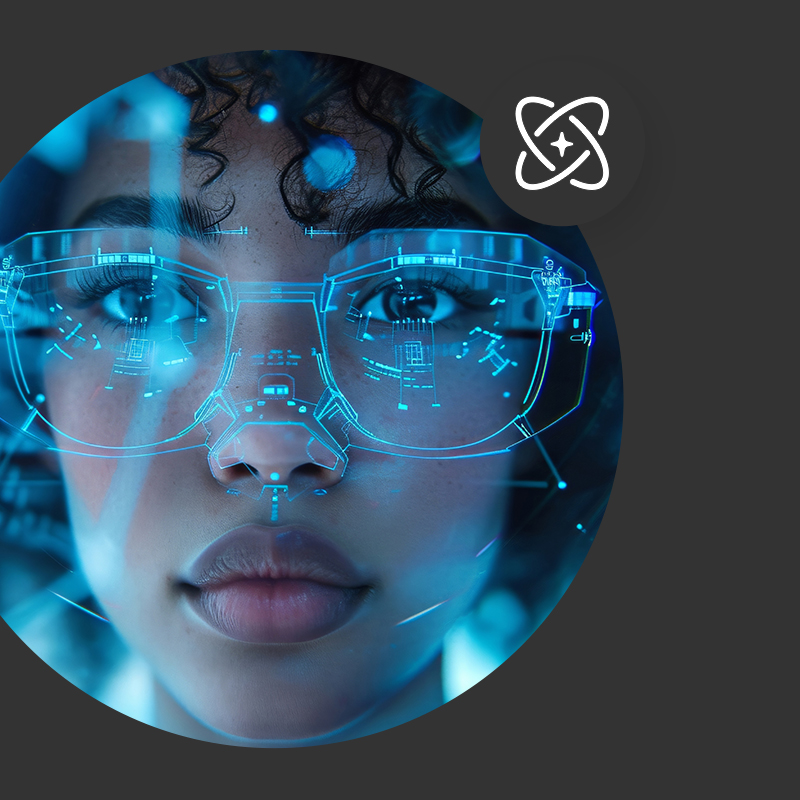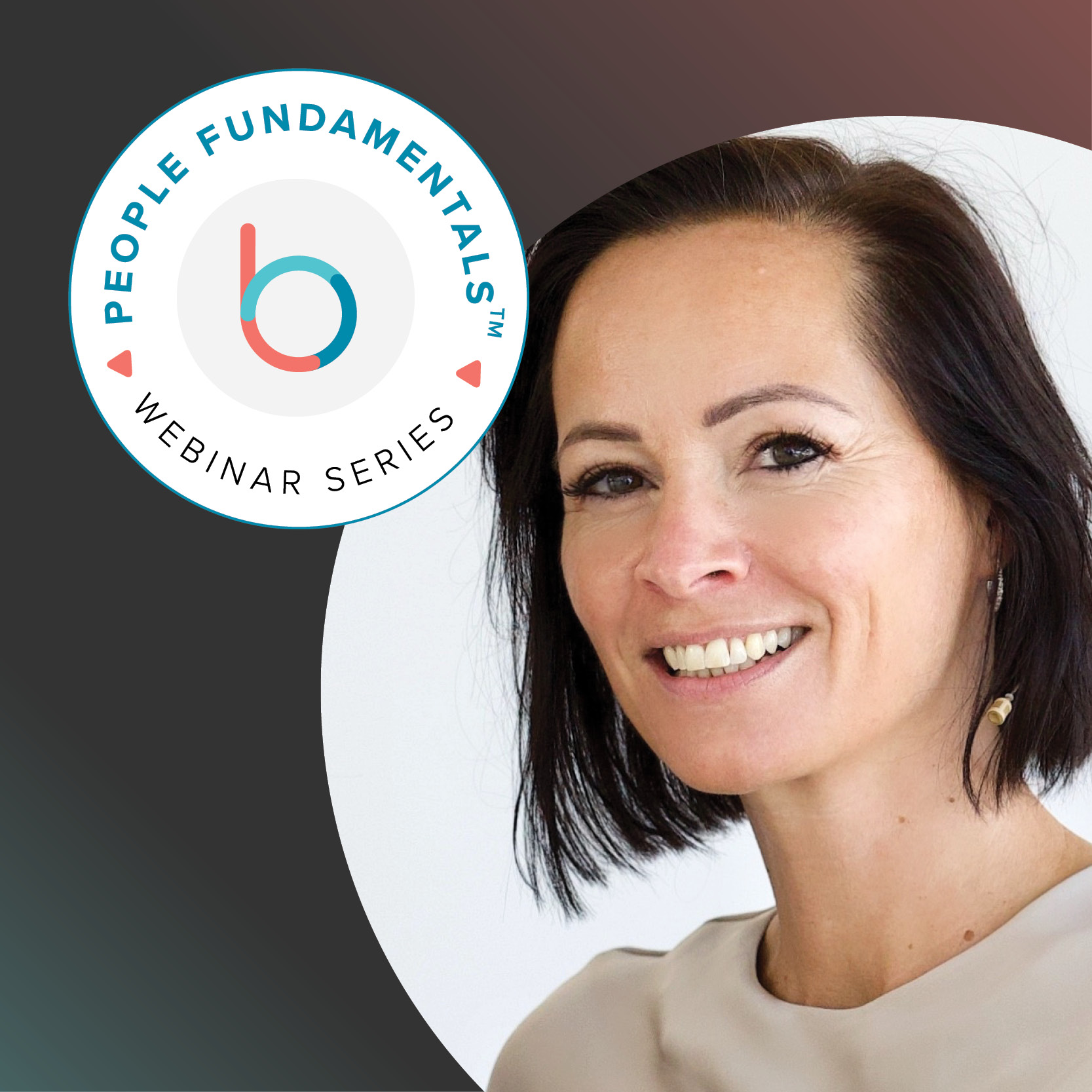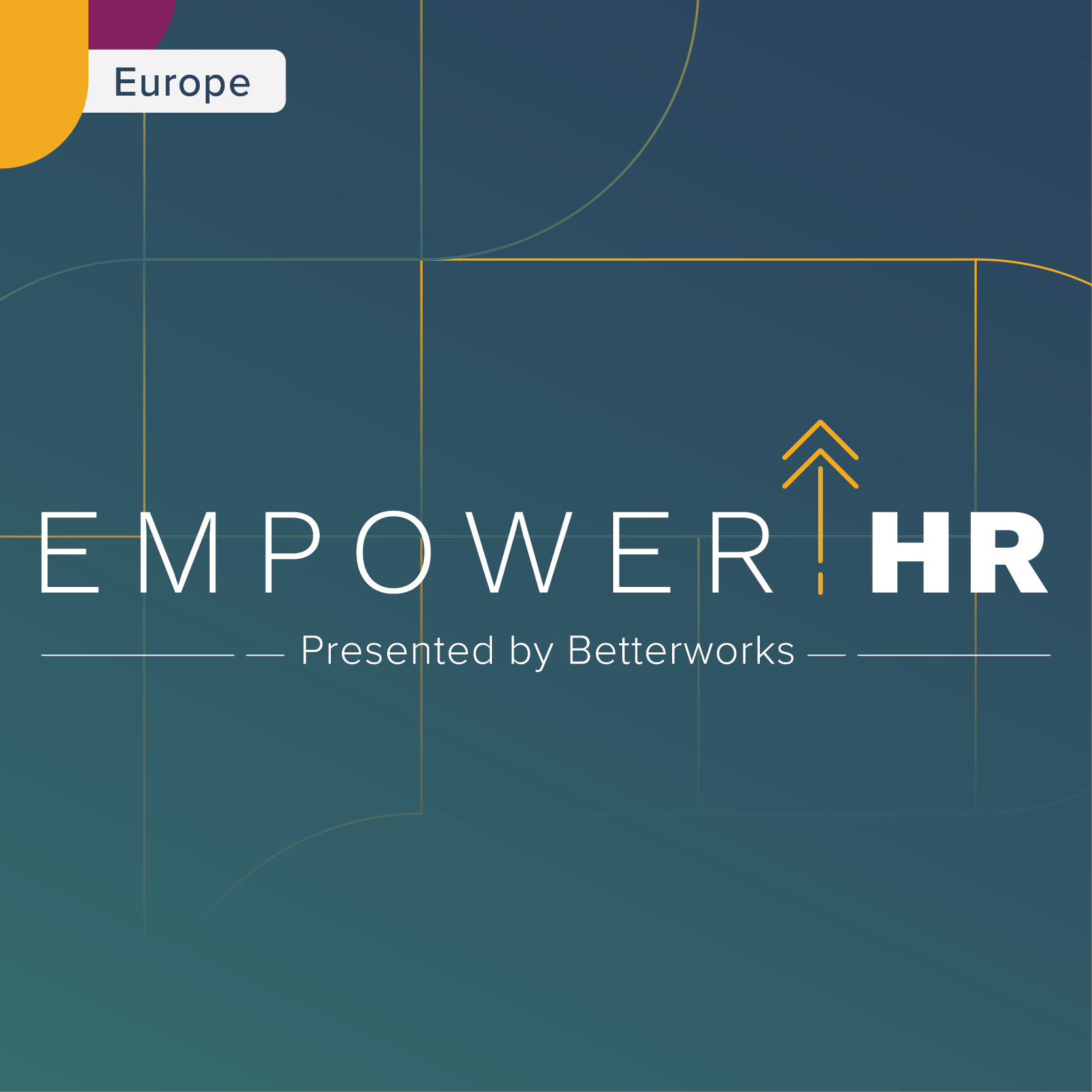On this episode of the People Fundamentals podcast, we’re joined by Sabrina Park, senior director of global talent management at Rivian.
We discuss how AI is introducing significant efficiency gains, the evolving challenges facing managers in the modern workplace, and how an overarching talent philosophy helps direct performance management processes.
Park has devoted her career to organizational behavior and development, starting with her first job out of grad school as an organizational development consultant at Washington Mutual Bank. Today, her experience and expertise are increasingly needed for thoughtful and intentional solutions in today’s rapidly evolving workplace.
Tune in to discover how Park and her team at Rivian are addressing the tough questions facing every HR leader today — and how she’s leaning into simplicity and a focus on what’s best for employee growth.
Subscribe wherever you listen to podcasts: Apple Podcasts | Spotify | YouTube
Harness the power of generative AI
The biggest buzz in HR is the impact of generative AI on how we work. Park has used genAI to develop and refine job descriptions, and she sees AI’s value in supporting managers during the performance management process.
“It eliminates a lot of barriers to entry for managers having some difficult conversations,” she says. Giving performance feedback can be intimidating, especially when starting with a blank slate. GenAI pulls historical performance data to create a first draft, giving managers something substantial to modify.
GenAI could revolutionize how we manage skills, too. “We have been thinking about the skills world,” Park says. “How do you leverage identifying skills, assessing skills, and then tying it to internal mobility or career growth and career progression?”
If an intelligent performance management system can track skills as employees develop them in the flow of work, you can get a better view of the organization’s skill set. An AI-powered skills architecture helps employees see opportunities for growth.
“Employees constantly want career growth and development, and we also say, ‘Well, employees own it,’” Park says. “And so if you have technology to help accelerate that or make it more transparent, I think that’s all the better.”
Simplify managers’ obligations
Employee expectations of companies have evolved, with more and more expected of managers — to the point where it can feel overwhelming and “almost unmanageable,” Park says.
In a recent engagement survey, Park asked, “‘Are the ways we’re working getting more difficult every day?’” she says. “And the answer was, ‘Yeah, it is.’ And it was especially high amongst our leaders and our senior leaders.”
Managers have a high workload of their own, even as they must do more and more to help their teams navigate rapid changes.
As a leader, this issue is top of mind for Park. She’s finding ways to simplify managers’ workloads so they can unlock their reports’ potential. “How do you create efficiencies in the flow of work to make their job easier?” she says.
Much of that answer is about clarifying expectations. “How do we create clarity, as much as possible?” she says. “That’s become a running theme not only for employees but amongst senior leaders, is that they want more and more clarity as more and more change comes.”
Set a North Star to guide your growth
Park and her team at Rivian rely on a strong talent philosophy to stay focused: “Performance can always be improved. Employees should always know where they stand. Development is owned by employees and enabled by managers.”
Whenever Park and her team alter performance processes, the changes must be consistent with that philosophy. That North Star has shifted how Park thinks about performance management. “One of the things that’s implicit, that underlines all of these points on our philosophy, is that we are managing to the highest common denominator,” Park says.
Instead of viewing performance management as limiting, Park recognizes its potential to drive growth. “It’s more of ‘What is the opportunity?’ versus trying to be very rigid and coming from a place of ‘No,’” she says. “So it’s really wanting to make sure that people are growing and learning, and that we are giving as much opportunity as possible for them to be successful here.”
People in This Episode
Sabrina Park: LinkedIn
Full Transcript
Sabrina Park:
Employees constantly want career growth and development, and we also say, “Well, employees own it.” And so, if you have technology to help accelerate that or make it more transparent, I think that’s all the better.
Alex Larralde:
Hi, everyone, and welcome back to Betterworks’ Podcast, People Fundamentals. I’m your host, Alex Larralde, senior director of corporate marketing. Betterworks’ core belief in people fundamentals revolves around enabling everyone in the workforce to strive for excellence, to foster creativity, and to acknowledge each individual’s contributions. Betterworks translates these beliefs into business fundamentals through strategic HR leadership, and in this show, we’re diving even deeper into these principles as we hear from the experts about how you can make them come alive in your organization.
And in today’s episode, we’re exploring the transformative impact of AI in the HR space. To do that, we’re talking to someone with a lot of experience in this area: Sabrina Park, senior director of global talent management at Rivian.
Sabrina shares her insights on the growing role of AI in HR, emphasizing that we can no longer afford to overlook this tool. We have to embrace its potential. We discuss how AI is changing the game in tasks like performance reviews and job description enhancements, leading to significant efficiency gains. Sabrina shares the challenges managers face in the modern workplace, where expectations have evolved and the role of a leader has become increasingly demanding. We explore how technology, including AI, can help ease the burden on managers while promoting fairness, and consistency, and feedback in development processes.
Rivian’s talent philosophy is a central theme throughout our conversation. Sabrina provides a glimpse into this, where the focus is on continuous performance improvement, transparency for employees, and the critical role of managers in enabling employee growth and development. As we delve into these insights, we consider how these principles align with Rivian’s culture and the broader HR landscape. The conversation sheds light on the pivotal shift towards simplicity and clarity in HR processes, making life easier for both employees and managers.
So, stay tuned for this conversation with Sabrina, which was recorded live at HR Tech 2023 in Las Vegas, and get ready to dive deep into the world of HR, talent management, and the transformative impact of AI.
Right now, I’m sitting down with Sabrina Park, the senior director of global talent management at Rivian. Hello, Sabrina.
Sabrina Park:
Hi, Alex. So good to see you again.
Alex Larralde:
It’s great to see you, too. So you’ve been here for a few days, you’ve been walking the floor, attending sessions. What’s jumping out at you? What’s the big takeaway this year?
Sabrina Park:
How much AI is taking over the world of HR, and we can’t sleep on this anymore.
Alex Larralde:
Absolutely. It’s so true. And I don’t know if I mentioned to you, we just did some research — and we’re going to be releasing a report on more of this research in full very soon because I think people really want this data. But we surveyed over 1,000 employees to learn their sentiments about AI, and we found that a lot of them are already using generative AI. They’re already using tools like ChatGPT to do things like performance reviews, other kinds of content creation that can be hard to start.
What do you think of that? What risks do you see there? What opportunities do you see?
Sabrina Park:
Well, interestingly enough, I was writing a job description for a position I was hiring for, and I was just trying to update my existing one. And I asked ChatGPT, “How can you improve my job description?” and it spit out some recommendations and I was like, “OK, this is a great starting point.” It’s amazing what it can do.
Alex Larralde:
Huge efficiency gains.
Sabrina Park:
For sure. For sure.
Alex Larralde:
Yeah. And that’s one of the things that we’re really excited about, at least for managers in the realm of performance management. So you’re a customer of ours. Rivian is using us for conversations and manager check-ins. And one of the opportunities we see is by making that process a little less intimidating. It’s kind of stressful to give feedback. It is. But if you’re able to do it with the help of AI, you’re probably more likely to do it more often, right?
Sabrina Park:
Right. And it’s hard because — we always talked about just-in-time coaching or feedback or training. Because you’re not getting, as a manager, maybe, performance feedback all the time or constructive feedback. And so, it’s a mission that is not built — you want to build up to it. And so I think for managers, to have something that is helpful, it eliminates a lot of barriers to entry for managers having some difficult conversations, so it’s awesome.
Alex Larralde:
Absolutely. And I think it also makes it more fair.
Sabrina Park:
Absolutely.
Alex Larralde:
Because we’re human beings and we’re biased, recency biased. There’s all sorts of stuff that can color that feedback. But if we’re able to use AI to help weed that stuff out, normalize it, I think there’s a lot of opportunity for things to become more fair.
Sabrina Park:
Absolutely. For sure.
Alex Larralde:
Are there other applications in HR that Rivian is considering, that you’re talking about. How are you thinking right now about how this works for your team, specifically, for talent management?
Sabrina Park:
Sure. We have been thinking about the skills world. And how do you leverage identifying skills, assessing skills, and then tying it to internal mobility or career growth and career progression? And so really been interested in getting more in-depth into that space, for sure.
Alex Larralde:
Yeah, absolutely. And I think there’s potential there, too, with AI because when you think about it, if you’re accomplishing a goal and you’ve done that work in the system, like Betterworks tells you, “This person did X, Y, and Z,” then presumably. because they had that experience or completed that task or project, they now have the associated skill, right? I think there’s a lot of power there. for sure.
That’s been coming up a lot, actually, as I’ve been talking to people because I think people are realizing that their best talent pool is already working for them. I mean, these people are already onboarded. You don’t have to go spend money to hire them. We were talking about interviews before we started recording. You don’t have to go through exhaustive interviews to figure out if they’re a culture fit. So I think there’s a lot of really interesting applications.
Sabrina Park:
For sure. And employees constantly want career growth and development, and we also say, “Well, employees own it.” And so if you have technology to help accelerate that or make it more transparent, I think that’s all the better.
Alex Larralde:
Absolutely. I want to talk about you a little bit, though.
Sabrina Park:
Sure.
Alex Larralde:
Where did you start your career in HR?
Sabrina Park:
I’ve always been in the org development space. So out of college, I didn’t know what I wanted to do. What I knew I could do was school, so I went straight to grad school. And from there, I did a little bit more and, finally. I was like, “I think I need to go get some real-world experience.” And so I did go to school for organizational behavior, and also got my MBA, and I needed to apply it. And so my first job out of grad school was at Washington Mutual as a senior OD consultant. Been in OD my entire career, essentially.
Alex Larralde:
Yeah, an expert.
Sabrina Park:
I wouldn’t go that far.
Alex Larralde:
You are an expert.
Sabrina Park:
Well, thank you.
Alex Larralde:
You’ve been doing it for however long.
Sabrina Park:
We won’t say that.
Alex Larralde:
Right. Yeah. Three years, right?
Sabrina Park:
Yes.
Alex Larralde:
I jest, I jest. But looking back at where you started and some of the challenges, what’s changed? Are those challenges solved or have those challenges that organizations face just evolved into new challenges?
Sabrina Park:
I think the role of the leader or the role of a manager has become really hard. That’s one of the things that I’ve been thinking about a lot lately. I mean, the world has changed. Went through the financial crisis and then the pandemic and all of that. And so it’s just the way we work and what employees’ expectations are of companies has changed. It’s incredible to see the evolution of it.
But I’ve been noodling on this, and I know Gartner just published a study, as well, about the role of the leader and the role of the manager specifically, and how much is expected of managers these days that it’s almost unmanageable. So it’s very interesting to see that. And I experienced that leading my own teams. You have to be everything, and also do IC work, as well.
Alex Larralde:
Exactly.
Sabrina Park:
Which, it’s interesting.
Alex Larralde:
It is. As a manager myself, I know I’m always walking that line and trying to find that balance between getting in the middle of everything and being a part of the team and rolling up my sleeves, versus stepping back a little bit to help coach and develop. Because that’s really one of our responsibilities is to give people those opportunities, because how else are they going to grow? But it’s hard. because you have the business mandate on top of it. You have goals to hit. Things have to happen, right? And it’s so important to replace. I agree. It’s a really interesting paradigm shift that we’re dealing with. How are you thinking about this at Rivian, specifically? What are some ways that you’re taking action on that?
Sabrina Park:
We just got our pulse survey back — our engagement survey, I should say. We ask questions that we have hypotheses around. And we pressure-test that with our engagement survey, and it’s a little bit of an unconventional route. We intentionally asked, “Are the ways we’re working getting more difficult every day?” and the answer was, “Yeah, it is.” And it was especially high amongst our leaders and our senior leaders. And so there’s an element of manager and leadership development. absolutely, but also looking at how do you create efficiencies in the flow of work to make their job easier.
Alex Larralde:
Absolutely.
Sabrina Park:
And so we’re looking into that. as well.
Alex Larralde:
Yeah, that’s awesome. Yeah. It’s one of the, I think, biggest challenges that we’re going to face in this new world, the post-pandemic world, especially with remote work and hybrid work. It’s always been the case that managers are not born. They’re made. And this is not an inherent skill set for most people, leadership. And you can make great leaders, but you have to be intentional about it.
Sabrina Park:
Absolutely.
Alex Larralde:
But we’re so accustomed in business to just plucking great individual contributors out of their teams and saying, “You’re now in charge.”
Sabrina Park:
Right, right.
Alex Larralde:
But how are we setting them up to succeed? It’s one of the many things we do in business that there’s just inertia. We just kind of accept it’s not a great model, but we do it. But I do think that the companies that figure out how to make their managers’ lives easier are going to be the ones that win.
Sabrina Park:
Absolutely. Absolutely.
Alex Larralde:
I really believe that.
Sabrina Park:
Yeah. And I think for us, too, it’s also, how do we create clarity as much as possible? That’s become a running theme not only for employees but amongst senior leaders, is that they want more and more clarity as more and more change comes. So yeah, how do you build that muscle? For sure.
Alex Larralde:
Exactly. There’s so much happening now, especially in 2023, with GenAI, right? I like to think we woke up in the morning in January, and then by the end of the day, everything changed.
Sabrina Park:
Totally. For sure.
Alex Larralde:
And so now we’re making sense of it, but it can be hard for employees to keep up and to know how companies are responding to these shifts in the market. And of course, they’re also getting their own news, and they have their own interpretations of what’s happening, and reconciling that can be really challenging for sure.
Sabrina Park:
Yes, absolutely.
Alex Larralde:
When you go home, what are you fired up about doing?
Sabrina Park:
Well, I’m trying to figure out how do we incorporate some of the GenAI work into our systems and platforms, and so it’s awesome to see what Betterworks has done and announced and launched. And also, kind of to solve this problem of the role of the manager, as well as how do we make the ways we work easier for employees and leaders in our company?
Alex Larralde:
Yeah. Simplicity, back to basics. I feel like that’s got to be the theme for all of us going forward. Because sometimes, it really is that simple. How are we taking care of people? How are we making their lives easier? And everything that we build should be in the service of that, right?
Sabrina Park:
Yeah, for sure. Yes.
Alex Larralde:
So you have spoken openly about Rivian’s talent philosophy, that performance can always be improved. Employees should always know where they stand. Development is owned by employees and enabled by managers. I love that. Love that. So walk us through how you developed those guidelines as a team.
Sabrina Park:
Yeah. One of the things that’s implicit, that underlines all of these points on our philosophy, is that we are managing to the highest common denominator. And RJ Scaringe, our CEO, says that, and we have adopted that kind of mindset …
Alex Larralde:
I love that.
Sabrina Park:
… as we went into creating our philosophy. And so that’s why we are always saying it’s more of, “What is the opportunity?” versus trying to be very rigid and coming from a place of, “No.” So it’s really wanting to make sure that people are growing and learning, and that we are giving as much opportunity as possible for them to be successful here.
Alex Larralde:
That’s incredible, and it sounds like it could really form the backbone of your culture.
Sabrina Park:
Absolutely. Yes. For sure. For sure.
Alex Larralde:
Yeah. Amazing.
Sabrina Park:
Yeah.
Alex Larralde:
Well, thank you so much, Sabrina.
Sabrina Park:
Of course. Thank you for having me.
Alex Larralde:
The rise of AI in HR is not just a trend. It’s completely changing work as we know it. As Sabrina quickly pointed out, we can no longer sleep on this transformative technology. One of the most pressing challenges in HR is the evolving role of managers. The demands on them have increased and the need for consistent, fair, and efficient feedback processes has never been more critical. And AI can help managers in their journey to provide better guidance and support to their teams.
So what can you do at your organization? Here are a few actionable steps to consider. First, embrace AI. Explore how AI can streamline your HR processes from recruiting to performance management. Start small, experiment, and evaluate the impact. And of course, first make sure you have the right safeguards in place. Support your managers. Offload some of the responsibilities you’ve placed on them. Remember, less is more. Recognize the increasing demands on your managers and provide them with the tools and resources they need to succeed. Leadership development, along with AI-driven support, can be game-changing.
Define your talent philosophy, like how Sabrina discussed what they’re doing at Rivian. Develop a talent philosophy that aligns with your organization’s values and goals. Emphasize continuous performance improvement, transparency, and the role of managers in employee development. And lastly, prioritize clarity and simplicity. As you revamp your HR processes, ensure that employees understand their roles, expectations, and career growth paths. HR is evolving rapidly, and organizations that adapt to these changes will thrive in the coming years.
Be sure to stay tuned for our next episode of the People Fundamentals podcast. We’re going to be digging into how you can leverage age diversity in a multigenerational workforce with the incredible Lindsey Pollak. Subscribe to us on Apple Podcasts, Spotify, or Google to find out what’s in store. And if you like what you hear, share us with your friends and colleagues. We’ll see you again soon.







